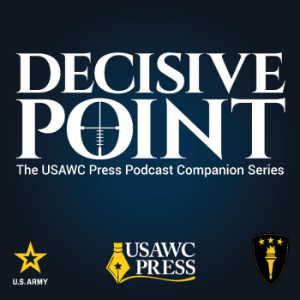
Decisive Point Podcast
News & Politics Podcasts
Decisive Point, the Parameters podcast companion series, furthers the education and professional development of senior military officers and members of the government and academia who are concerned with national security affairs. The podcast debuted in August 2020 and spans four seasons and more than 100 episodes, featuring Parameters authors discussing the research presented in their articles. Episodes range from 10–15 minutes long and cover various topics, including foreign policy, strategy, military history, gender-related issues, counterinsurgency, Landpower, and more. The entire series can be found at: https://www.dvidshub.net/podcast/582/decisive-point-podcast
Location:
United States
Genres:
News & Politics Podcasts
Description:
Decisive Point, the Parameters podcast companion series, furthers the education and professional development of senior military officers and members of the government and academia who are concerned with national security affairs. The podcast debuted in August 2020 and spans four seasons and more than 100 episodes, featuring Parameters authors discussing the research presented in their articles. Episodes range from 10–15 minutes long and cover various topics, including foreign policy, strategy, military history, gender-related issues, counterinsurgency, Landpower, and more. The entire series can be found at: https://www.dvidshub.net/podcast/582/decisive-point-podcast
Language:
English
Contact:
404-282-1450
Website:
http://www.dvidshub.net
Email:
itunes@dvidshub.net